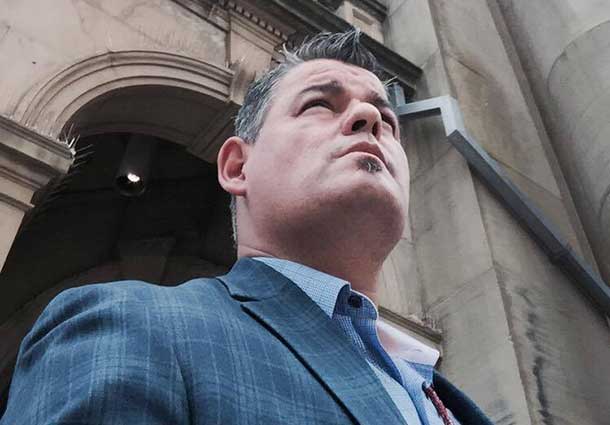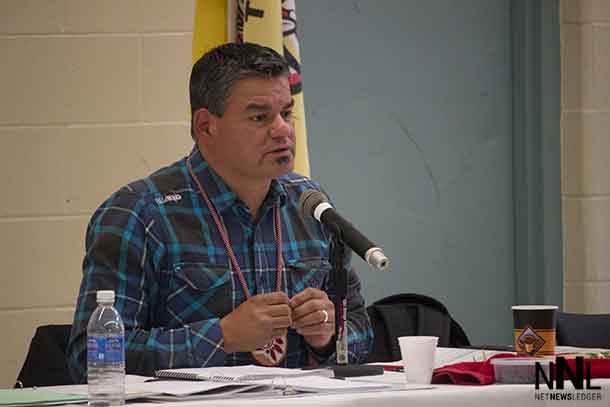
TORONTO – Ontario Regional Chief Isadore Day in an open letter to the Canadian Council of Ministers of the Environment is addressing the need for Nation-to-Nation discussions on First Nation priorities for achieving environmental sustainability and ensuring protection of title and rights for First Nations.
The Regional Chief says that the Canadian Council of Ministers of the Environment offered First Nations leaders a short, ninety-minute meeting. Ontario Regional Chief Day reflects, “In a ninety-minute meeting, we would basically only get through the introductions. A ninety-minute meeting is simply like putting three drops of water on the lips of three people dying of thirst.”
This proposed meeting would include First Nations, Metis, and Inuit groups.
Here is the Text of the Regional Chief’s Letter to Ministers of the Environment:
“This letter is in response to the Canadian Council of Ministers of the Environment (CCME) letter to the National Indigenous organizations for a quick meeting with the CCME. The short ninety-minute session afforded by the Ministers is inadequate to address our First Nation priorities. As a former treaty spokesperson for the Robinson Huron Treaty, former Chief of my community, and now Regional Chief, I continue to be involved in legitimate meetings with Crown governments. This ensures so that the right people are communicating with one another on important matters. There are three important process priorities I highlight for your immediate consideration:
- Nation-to-Nation markers going forward in Canada on Environment
“The “Canada-Wide Accord on Environmental Harmonization” should be inclusive of Indigenous governments. In the interim, tripartite commitments should be made so that Crown Ministers are aware of active environmental decision-making being undertaken within Indigenous governments and find ways to “make space” for co-governance at every opportunity.
“Ministers, you need to start engaging with the title and rights-holders on a Nation-to-Nation basis. Also, the climate agenda is so important and worthy of a national gathering on the Environment with Indigenous representatives who hold decision-making authority over their lands and resources — I would ask now for that commitment to begin organizing a serious initial discussion on the development of a gathering. But I must also caution that expecting First Nations to be of one mind on process and proper engagement is to forget all the serious damage the Indian Act and other colonial instruments have done to the Indigenous peoples in Canada. For that, we think a special commitment needs to be made to the First Nations in Canada. Canada must stop treating us as one generic entity via the Assembly of First Nations. We have diverse cultures, languages, laws, and experiences within Canada and a Nation-to-Nation plan is the only way to respect this diversity.
“As Ministers of the Environment, you are obligated to welcome and encourage First Nations communities to continue to practice our culture, ceremonies, and way of life beyond our Indian reserves on our ancestral lands in a meaningful way. Protect our sacred places that exist on Crown land or otherwise. These are just two national commitments your Ministers can make to First Nations that are important to reconciliation.
- Climate Change for Life and true National Interest
“I welcome action and commitments by every government in Canada to put us on a more sustainable path towards a more certain and sustainable climate future. The First Nation governments in Canada do need a seat at every table that results in changes to legislation, regulation, and policy that are going to impact First Nations’ ways of life. We need to be accommodated in grand climate schemes because we are already so impacted, by climate change itself, and by being on the sidelines of the economic priorities for so long.
“There are species of animals that are critical to our culture. Should these species become extinct, many of our ceremonies, educational practices, and our ways of life will die with them. I commend the Nations that came together in our traditional ways of working together for all of our relatives when they agreed to specifically protect the caribou population. Canada needs to facilitate more of these efforts by and for First Nation peoples.
“We have heard about how provincial, territorial and Federal legislation around species at risk needs to be much more proactive in terms of climate change and critical habitat for many species that are core to the identity of Canada itself, especially the North. The adaptation piece on climate change is something that requires immediate Nation-to-Nation discussions between First Nation governments and Crown governments. Special, ameliorative policies are required across Canada to assist First Nations take part in the green economy of the future. We must make policy that makes conditions better, not simply to alleviate impacts.
“A more adequate national interest test must include reconciliation within legislation across Canada. In discussions around Federal legislation, we understand a public interest test to work against First Nations’ rights and title. We need to have a more inclusive discussion about how Crown governments are accommodating, observing and implementing aboriginal and treaty rights in Canada so these rights are constitutional rights that last forever, indeed that our ways of life are celebrated across the land.
- Legislation / Reciprocity of Indigenous Laws and Jurisdiction
“Some legal institutions are gaining traction in light of the Truth and Reconciliation Commission’s calls to action. Indigenous laws must continue to co-exist across Canada for Canada to have a truly sustainable environment. In discussions with Canada, we speak of “making space” for Indigenous laws but the space must be made in legislation, not just a policy piece that a future government can ignore.
“Self-determination is about more than simply recognizing a possibility. Self-determination is about consent and decision-making. Our laws will bring clarity and certainty to these newly recognized authorities under the doctrine of free, prior and informed consent. Government to government discussions are needed now, with the Crown governments and Indigenous governments to ensure there are solutions found everywhere, in the short, mid and long-term to make more space and to bring more capacity for First Nations to exercise their jurisdiction, as the oldest governing authorities in lands and territories of Canada.
“Another piece, that has been an easier conversation, is the capacity needed so that our vital Indigenous knowledge systems (IKS), continue to guide all decision-making around the environment. We see good news in various provinces and territories as well as a more welcoming discussion on this topic with the Federal government. Let’s carry that forward and promise the youth of today that this knowledge is sacred to all of Canada.
“To quote Grandmother Josephine Mandamin, Waterwalker, Wikwemikong Unceded Territory:
‘Governments need to know that we are still alive — and that we need to practice our sovereign ways in terms of how we govern ourselves. More importantly, our treaties have been broken, and this needs to be resolved.
‘Our animals, and especially the fish, are the first to suffer because of the water. Invasive species like the carp have been infiltrating into our freshwater systems. The environment needs to be looked at in terms of how we see things. Our way of looking at Mother Earth is different from Western approaches. Our hearts are on the ground rather than our heads being in the air.’
“We need to seriously think about how we can work together with our non-Indigenous Brothers and Sisters. One cannot exist without the other. We must cooperate and co-exist as one two-legged nation.”
“In closing, as Ministers of large jurisdictions, you must all recognize that you cannot represent every diverse voice in your constituency without consultation. Expecting National Indigenous leaders to do so at your behest can no longer be the plan forward.”







